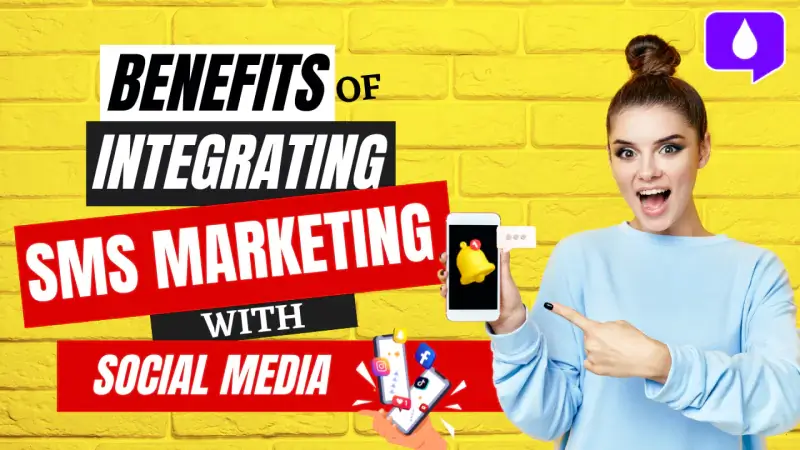20 Feb 2023
Dhaval Gajjar

20 Feb 2023
Dhaval Gajjar
As businesses continue to expand their digital marketing efforts, it’s becoming increasingly important to find new and innovative ways to engage with customers. One such approach is integrating SMS marketing with social media platforms. By combining these two powerful tools, businesses can create a more comprehensive and effective marketing strategy that reaches customers across multiple channels.
SMS marketing allows businesses to send targeted and personalized text messages to their customers, while social media platforms provide a space for businesses to engage with customers and build brand awareness. By integrating the two, businesses can maximize their reach and impact, and create a seamless customer experience.
In this article, we will explore the benefits of integrating SMS marketing with social media platforms, including increased customer engagement, improved targeting and personalization, and better analytics and insights. We will also provide practical tips and best practices for implementing a successful integrated marketing campaign.
SMS marketing is a powerful tool for reaching potential customers directly on their mobile devices. It involves sending text messages to a targeted group of people with the goal of promoting a product, service, or event. In this section, we will define SMS marketing, explain how it works, and explore the different types of SMS marketing campaigns that businesses can use to engage with their audience.
SMS marketing is a form of mobile marketing that uses short message service (SMS) technology to send promotional messages to customers. It can be used by businesses of all sizes, from small local companies to large corporations. SMS marketing messages are typically short and concise, and can include information about sales, special offers, events, new products, or any other relevant updates.
SMS marketing is a permission-based marketing strategy, meaning that customers must opt-in to receive messages from the business. This can be done by providing their phone number through a sign-up form, in-store promotion, or by sending a text message to a specific number. Once customers have opted-in, they can usually opt-out at any time by sending a specific keyword to the business.
SMS marketing works by sending text messages to a group of people who have opted-in to receive them. These messages can be sent using SMS software or a third-party service. The messages are sent to a list of phone numbers that have been collected from customers who have given permission to be contacted.
One of the benefits of SMS marketing is that it can be highly targeted. Businesses can segment their customer list by demographics, interests, or past purchases to send personalized messages. SMS marketing can also be used to send time-sensitive messages, such as reminders, alerts, or emergency notifications.
There are several different types of SMS marketing campaigns that businesses can use to engage with their audience. Here are some examples:
Social media platforms have revolutionized the way businesses connect with customers, allowing for greater engagement, reach, and brand awareness. With so many social media platforms available, it can be difficult to know which ones to focus on and how to make the most of them for marketing purposes. In this article, we’ll provide an overview of popular social media platforms, explore the advantages of using social media for marketing, and highlight key features of social media platforms for marketing purposes.
There are many social media platforms available today, each with its own unique features and user base. Some of the most popular platforms include:
There are many advantages to using social media platforms for marketing purposes, including:
When it comes to marketing on social media platforms, there are a few key features to keep in mind, including:
Social media platforms provide a wealth of opportunities for businesses to connect with customers, create effective marketing strategies that engage and resonate with their target audience and achieve marketing success.
With so many marketing channels available, it can be challenging for businesses to create a cohesive and effective strategy. However, by integrating SMS marketing with social media, businesses can reach customers across multiple channels and create a more comprehensive and impactful marketing campaign.
Integrating SMS marketing with social media provides a range of benefits for businesses, including:
To make the most of an integrated SMS and social media marketing campaign, businesses should follow these best practices:
There are many examples of businesses that have successfully integrated SMS and social media marketing campaigns, including:
Integrating SMS marketing with social media provides a powerful and effective way for businesses to reach and engage with customers.
In order to make the most of this powerful combination, businesses must follow best practices and avoid common pitfalls.
Tips for Maximizing the Benefits of SMS and Social Media Marketing:
In conclusion, integrating SMS marketing with social media platforms can be a highly effective way for businesses to reach a larger audience and create more personalized marketing campaigns. By following best practices, avoiding common pitfalls, and using tips to maximize the benefits of SMS and social media marketing, businesses can create successful and impactful marketing campaigns.